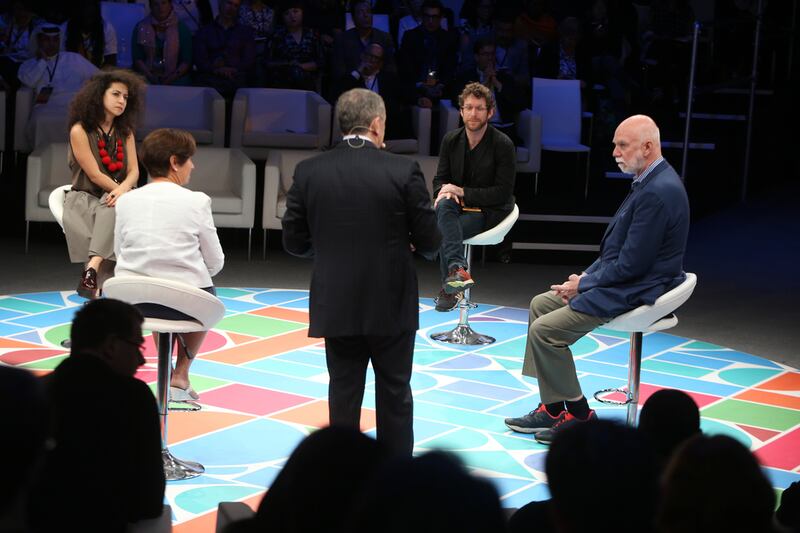Guggenheim Abu Dhabi, clowns, comedy television and theatrical performance were among the diverse subjects discussed during the first day of Culture Summit.
Titled The Universals: What the Arts Tell Us About How We Can Come Together, the discussion was aimed at summarising the universal power of art in the capital. It is one of several short discussions organisers hope will trigger productive thought and future action for the audience, which was made up of international cultural leaders who have flown to Abu Dhabi for the summit from all over the world.
The four speakers at yesterday’s session talked about how the arts are capable of changing people and places at a basic level – for example to combat terrorism or involve people in politics – and to help social relationships.
Sheikh Nahyan bin Mubarak, the UAE’s Minister of Culture and Knowledge Development, touched on this point in his opening address, where he mentioned the universal language of the arts.

Sheikh Nahyan bin Mubarak, UAE’s Minister of Culture and Knowledge Development, speak at the summit. Delores Johnson / The National
“[It] is a beautiful and stimulating language that is understood all over the world,” he said. “The arts connect us in ways that make us wise and establish bonds that unite us over many issues. They tell us what we do not know; they show us the importance of shared values and the necessity for peace. In fact, the future of our planet depends on the success of that ecosystem.”
His address served as a fitting introduction to the discussion, during which Cynthia Schneider, a professor of diplomacy at the Georgetown School of Foreign Service, advocated arts as a way to generate empathy.
She heralded the storytelling power of television and film as being able to “counter the horrendously seductive stories of terrorism”.
She also mentioned that she believes arts and culture work effectively in diplomacy, and told stories of how she used theatre productions from all over the world to “humanise global politics through the power of performance”.
Sabine Choucair – who runs Lebanese theatre company Clown Me In, and works as a clown performer within marginal communities around the world using comedy and performance to break down barriers – picked up on these thoughts.
“No matter where we are or what we are going through we are all connected and we just need to find ways to connect. We fight extremism with culture,” she said.
However, Richard Armstrong, director of the Solomon R Guggenheim Museum and Foundation, issued a warning about being too broad and optimistic about generalising art and making it applicable to all cases.
He addressed the audience to say that we must be mindful of the word universal.
“It is better to talk about commonalities or parallel aspirations,” he said. “It is crucial in our thrust for being global that we recognise our differences as people and as civilisations.”
Removing those differences, he suggested, would mean to remove the nuance and crucial characteristics of art.
“The reason that people become artists is that they value nuance, so why would we as the allies of artist want to change that?” he said.
The most important thing, he continued, was to remain inquisitive because in learning to see things from different perspectives, we come to respect each other more – and perhaps reduce the conflict and hatred that exist in the world.
Armstrong also addressed the subject of the upcoming Guggenheim Abu Dhabi museum. He noted that it would be the “most successful, daring and comprehensive contemporary art museum in the world”, and predicted “an informative and catalytic response” to it across the region.

Noura Al Kaabi, chairwoman of the Media Zone Authority Abu Dhabi and twofour54 and Minister of State for FNC Affairs speaks at the summit. Delores Johnson / The National
Moderated by David Rothkopf, the chief executive and editor of FP Group, which is responsible for organising the summit alongside TCA Abu Dhabi, the 30-minute discussion quickly covered a range of subjects, but Rothkopf summarised it by saying art is not just something for the comfortable lifestyle.
“There is a place for arts in the middle of the front line and in a conflict zone,” he said. “Art it is a force for good, for education, for stability and for pushing back on negative forces.”
The final speaker, Dustin Yellin, an artist from New York and the founder of a non-profit company called Pioneer Works, described civilisation itself as a piece of art.
“Civilisation is a sculpture – everything we see we have built over thousands of years and art is about storytelling. It is a way of attributing meaning to the way we see our world,” he said.
Yellin described his practice as multidisciplinary, and said “not putting things in boxes” was the only way for humanity to progress.
“This idea that someone is only one thing is bananas,” he said. “We need to expand ourselves across lines and come together to move forward.”
• The Culture Summit continues until Thursday at Manarat Al Saadiyat in Abu Dhabi
aseaman@thenational.ae





